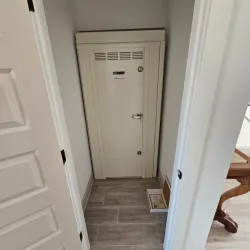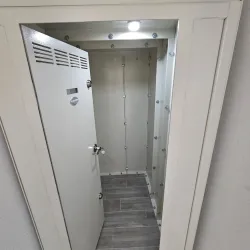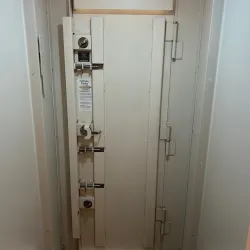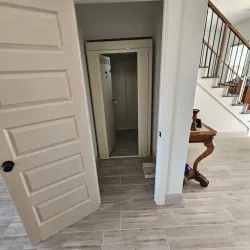"I decided to design and create a steel shelter that would fit into our under-stairs closet," David explains. The concept was revolutionary: instead of adapting homes to accommodate bulky shelters, why not create shelters that adapted to existing home spaces?
The first prototype was far from perfect. David describes it as "extremely bulky and each portion weighed about 500 lbs." Installation required "two hardy men" to maneuver the heavy components into the closet space. But despite its limitations, this first unit proved the concept worked and inspired months of refinement.
 When 17 tornadoes roared through the Dallas-Fort Worth area in 2012, one family's brush with disaster would ultimately revolutionize how thousands of families protect themselves from nature's most violent storms. What started as a wife's simple request for safety became an industry-changing innovation that brought FEMA-rated tornado protection inside the home for the first time.
When 17 tornadoes roared through the Dallas-Fort Worth area in 2012, one family's brush with disaster would ultimately revolutionize how thousands of families protect themselves from nature's most violent storms. What started as a wife's simple request for safety became an industry-changing innovation that brought FEMA-rated tornado protection inside the home for the first time.
This is the story of how retired homebuilder David Magiera transformed personal fear into life-saving technology, creating the first modular in-home tornado shelter system that has now protected families across Texas, Oklahoma, and beyond for over a decade.
The Night That Changed Everything
The spring of 2012 brought unprecedented tornado activity to North Texas. As David Magiera recalls, "17 tornados roared through DFW Texas" that season, with one twister passing just eight blocks from his family's home. For David's wife, Sheila, watching the destruction unfold so close to their neighborhood was a wake-up call that demanded action.
"Sheila asked me to get a tornado shelter for our home," David remembers. It was a reasonable request from a concerned wife and mother, but it would prove to be anything but simple to fulfill. What seemed like a straightforward safety purchase would reveal a glaring gap in the tornado shelter industry that no one had addressed.
Living in Texas means living with the reality of severe weather. The state averages 132 tornadoes annually, with Dallas and Tarrant counties both ranking in the top ten tornado "hot spots" statewide. For families like the Magieras, the question wasn't if severe weather would threaten their area again, but when.
Discovering an Industry Gap
When David began researching tornado shelter options, he made a surprising discovery. "I went online and discovered that no one had a shelter that could be installed inside the home," he explains. The entire industry seemed focused on two primary options: heavy, welded-steel units designed for garages and patios, or underground shelters buried in yards.
Both traditional approaches had significant drawbacks for families seeking practical protection. Garage and patio units required venturing outside during dangerous weather—exactly when families needed to stay indoors. Underground shelters, while effective against wind, posed flooding risks and required extensive excavation that many homeowners couldn't accommodate.
For David, a retired homebuilder with decades of construction experience, these limitations represented more than inconvenience—they represented a fundamental flaw in how the industry approached residential tornado protection. Families needed safe, accessible shelter that didn't require leaving the climate-controlled safety of their homes during severe weather.
From Problem to Innovation
David's background uniquely positioned him to tackle this challenge. As a retired homebuilder, he understood residential construction constraints and homeowner needs. His recent work creating steel, food-grade cooking products called Flaming Skewers for Holland America Cruise Line had connected him with skilled steel fabricators. These relationships would prove crucial in turning his vision into reality.
"I decided to design and create a steel shelter that would fit into our under-stairs closet," David explains. The concept was revolutionary: instead of adapting homes to accommodate bulky shelters, why not create shelters that adapted to existing home spaces?
The first prototype was far from perfect. David describes it as "extremely bulky and each portion weighed about 500 lbs." Installation required "two hardy men" to maneuver the heavy components into the closet space. But despite its limitations, this first unit proved the concept worked and inspired months of refinement.
Engineering Excellence Through Iteration
Over the following months, David focused on solving the practical challenges that made tornado shelters inaccessible to most homeowners. His engineering background and construction experience guided the development of what he called "a more efficient and modular model"—the ArmoredCloset Tornado Shelter and Safe Room.
The modular approach was key to the innovation. Instead of single, impossibly heavy units, David designed panels that could be transported, maneuvered through standard doorways, and assembled in place. This breakthrough made installation possible in virtually any area of a home, from under-stairs closets to bedrooms, garages, and utility rooms.
Within a year and a half, David had finalized his design and was ready for the ultimate test: professional certification. He arranged testing at the National Wind and Science Institute at Texas Tech University, where his shelter would face the same rigorous standards used to evaluate all FEMA-approved safe rooms.
Proving Safety Through Professional Testing
The testing at Texas Tech University represented a crucial milestone for ArmoredCloset. The National Wind Institute's Debris Impact Test Facility subjects shelters to simulated F-5 tornado conditions, firing 15-pound, 2x4-inch boards at 100 mph to replicate the most dangerous aspect of tornado damage: flying debris.
ArmoredCloset passed these rigorous tests, earning certification that its above-ground safe rooms meet or exceed current FEMA and ICC standards. Larry J. Tanner, P.E., NWI Research Assistant Professor and Manager of the Debris Impact Test Facility, confirmed in his official letter: "All tests were compliant with FEMA 320/361 (2008) and ICC-500 (2008). Congratulations on your shelter door passing the FEMA 320 & ICC-500 tests."
This certification validated David's innovative approach and established ArmoredCloset as the industry's first FEMA-approved modular in-home tornado shelter system. The testing proved that families could have "near-absolute protection" from F-5 tornadoes without sacrificing convenience or accessibility.
Beyond Personal Use: Industry Recognition
Success with his own family's shelter quickly expanded into broader applications. David's innovative design caught the attention of industries requiring specialized protection. "We have also designed and built blast-shelters for the computer industry and provided multiple shelters for the largest steel manufacturer in the U.S.," he notes.
The company also established relationships with homebuilders across Texas and Oklahoma, providing custom shelters for new construction projects. This B2B success demonstrated that ArmoredCloset's modular approach solved installation challenges not just for existing homes, but for builders seeking to integrate tornado protection into new residential construction.
Geographic expansion followed naturally. David explains: "We have also created custom-designed tornado shelters and safe rooms for thousands of homes in Texas, Oklahoma, Indiana, Arkansas, Florida and many other states. We travel and install all around the country. We also ship (with install instructions) to many customers in other states."
Continuous Innovation: Patents and Safety Features
Success didn't stop David from continuing to innovate. Through customer feedback and industry experience, he identified additional safety improvements that would set ArmoredCloset apart from competitors. One crucial development was the Door Jam Safety Flange, which addressed a serious safety concern.
"I learned from industry people that people - and children - were getting their fingers caught in the heavy - 1/4" steel door jam," David recalls. His solution was elegant and effective: "The Safety Flange is welded to the leading edge of the door and prevents anyone - young or old - from getting their fingers caught in door jam."
This attention to user safety extended throughout the design. The ArmoredCloset door features three exterior locks and three interior latch-bolts, plus a patented safety wrench that allows occupants to remove panels and escape if debris blocks the main entry. Every unit is secured to the concrete foundation with anchor bolts providing 20 to 50 tons of pull-out strength.
Material specifications reflect David's commitment to protection. Side walls and ceiling panels use 3/16-inch steel plate, while the entire door module is constructed from 1/4-inch steel. All components receive powder coating in an attractive heirloom beige color that integrates well with home interiors.
The Ballistic Window Innovation
Recent years have brought additional innovations, including the elegant Ballistic Window feature. This 1.25-inch thick, bullet-resistant acrylic window provides visibility while maintaining protection against both storm debris and security threats. Testing has proven the window's resistance to 9mm and 45-caliber ammunition, expanding ArmoredCloset's utility beyond tornado protection.
"Recently, we tested and incorporated an elegant Ballistic Window which is located at eye level in the entry door," David explains. This addition, along with ArmoredCloset's two patents on its design, demonstrates the company's ongoing commitment to innovation and improvement.
Comprehensive Protection Philosophy
What sets ArmoredCloset apart is David's understanding that families need protection from multiple threats, not just tornadoes. "Many customers use the ArmoredCloset for storing their guns and ammunition. Others use it to store valuables and jewelry," he notes. This versatility makes the investment practical year-round, not just during tornado season.
The dual-purpose design addresses home security concerns as effectively as weather threats. With walls rated to stop 45-caliber ammunition and multiple locking mechanisms, ArmoredCloset provides families with a secure retreat during home invasions or other security emergencies.
David emphasizes the peace of mind factor: "Most enjoy the safety, security and peace of mind that an ArmoredCloset brings to its owners. Plus, it is anchored to your foundation inside the comfort of your air conditioned home."
Installation Excellence and Customer Service
ArmoredCloset's success stems partly from David's insistence on professional installation and customer service. The company's trained installation teams bring years of residential building experience, ensuring each unit is properly secured and fully functional upon completion.
Installation typically takes just 3-4 hours, and the company provides GPS coordinates for each installation so customers can register their safe rooms with local emergency management offices. This attention to detail reflects David's understanding that a safe room is only effective if first responders know where to look for survivors.
The modular design that solved the initial installation challenge continues to benefit customers today. Units can be installed in virtually any location within a home: under stairs, in closets, garages, bedrooms, utility rooms, or even on patios. This flexibility allows families to choose locations that best serve their specific needs and home layouts.
A Legacy of Protection
More than a decade after that first tornado passed eight blocks from the Magiera home, ArmoredCloset has protected thousands of families across multiple states. The company David built from his wife's simple safety request has become the leading provider of modular in-home tornado shelters, setting industry standards for innovation, safety, and accessibility.
Customer testimonials reflect the peace of mind David's innovation provides. From Forney, Texas, customer Denise E. writes: "I cannot thank you enough. This has really eased my mind and I feel much better knowing I have a safe place to go in the event of a storm."
Paul W. from Oklahoma City adds: "After the spring tornado just south of DFW and north of us in Oklahoma City, I found Armored Closet on the Internet. David was able to customize the shelter to fit inside the contours of my under stairs closet. His personal attention made the difference."
Looking Forward: Continuing Innovation
Today, ArmoredCloset continues David's tradition of customer-focused innovation. The company maintains its Texas manufacturing base while serving customers nationwide, always seeking new ways to improve protection and accessibility for American families.
From its headquarters in Kennedale, Texas, ArmoredCloset operates both a showroom and manufacturing facility where visitors can see the quality and craftsmanship that goes into every unit. The company offers military, veteran, and first responder discounts, recognizing those who protect our communities.
David's journey from concerned homeowner to industry pioneer illustrates how personal experience can drive innovations that benefit thousands. What started as one family's search for safety has become a proven solution that brings FEMA-rated protection inside homes across tornado-prone regions.
Your Family's Safety Story
The ArmoredCloset story began with a simple recognition: families shouldn't have to choose between safety and convenience when protecting themselves from tornadoes. David Magiera's solution—modular, in-home shelters that meet FEMA standards while integrating seamlessly into residential spaces—has proven that families can have both.
Whether you're concerned about tornado season in Texas, severe weather threats in Oklahoma, or year-round security anywhere in the country, ArmoredCloset provides the same innovative protection that has kept thousands of families safe since 2012.
Your family's safety story can start with a simple conversation. Just as Sheila Magiera's request for protection led to industry-changing innovation, your decision to prioritize family safety can provide the peace of mind that comes from having FEMA-rated protection just steps away, inside the comfort of your own home.
Don't wait for the next severe weather event to threaten your area. Contact ArmoredCloset today to learn how their proven, patented technology can bring comprehensive protection to your family, just as it has for thousands of others across the nation.




